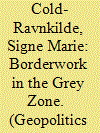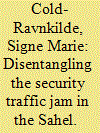|
|
|
Sort Order |
|
|
|
Items / Page
|
|
|
|
|
|
|
| Srl | Item |
| 1 |
ID:
188532


|
|
|
|
|
| Summary/Abstract |
EU externalised border control has become a bone of contention in EU–Malian relations. Based on fieldwork among Malian state officials, migrant associations and EU staff in Bamako, the article explores readmission agreements and border police collaboration. By examining the often-underestimated agency of national authorities, the article shows how EU border interventions aimed at producing control and confinement deep within the EU–African borderlands are contested and shaped by Malian state actors’ ‘borderwork’ (Rumford 2008). It argues that the contentious border politics produce ‘hidden acts’ through which moments of ‘sovereign exception’ (Agamben 1998) are produced in the ‘grey zone’ (Feldman 2019) of Europe’s externalised migration–security apparatus. Meanwhile, in the grey zone state actors’ everyday tactics of resistance are constitutive of new forms of sovereignty that is agency enabling.
|
|
|
|
|
|
|
|
|
|
|
|
|
|
|
|
| 2 |
ID:
172869


|
|
|
|
|
| Summary/Abstract |
Despite years of ongoing interventions by multiple external and regional actors, the security situation in west Africa's Sahel region is dramatically deteriorating. In this introduction to the special section of the July 2020 issue of International Affairs, we zoom in on four major external international intervention actors (France, the United States, the European Union and the United Nations) in the Sahel region's escalating ‘security traffic jam’. We argue that the diversity of intervention actors makes the Sahel a paradigmatic case for exploring a set of often-overlooked constitutive intervention effects. By adding new temporal, relational and spatial dimensions to the notion of ‘constitutive effects’ as introduced by post-structuralists in the 1990s, we (re)launch constitutive effects as a conceptual framework for approaching the study of ongoing intervention engagements. From this perspective, and as further illustrated in this special section, intervention continuity and escalation cannot be explained simply with reference to frameworks of ‘success’ or ‘failure’, but require a broader conceptualization of effects, including how specific threat perceptions, rationales and problematizations get constituted and consolidated through and during ongoing intervention practice. Contributions to this special section each unpack a diverse set of constitutive effects including the contested performance of security actorness, the (un)making of security alliances and partnerships, logics of choices produced by ongoing intervention practices, as well as the constitution of conditions for continual international involvement.
|
|
|
|
|
|
|
|
|
|
|
|
|
|
|
|
| 3 |
ID:
188529


|
|
|
|
|
| Summary/Abstract |
In the last 30 years Europe has attempted to strengthen its territorial borders with Africa through new migration governance practices. This article takes its point of departure in recent mass expulsions of Malian migrants from Algeria to reception centres in Niger to analyse the interlinked processes of deportation from North Africa to Mali and the increased dissatisfaction among the deportees ‘assisted’ by EU funded return and reintegration programmes in Mali. Through the analytical lens of the ‘anti-politics machine’ (Ferguson 1996), the article argues that the attempts to transform European borderwork practices into a ‘softer’ and ‘more humanist’ approach to migration management create new, contested, border zones aiming to obstruct African migrants’ mobility. The article shows how these new, EU-driven, migration management regimes, which are increasingly disconnected from local politics and mobility practices, spur contestations in Sahelian countries of origin, transit and reception. Thereby, the article provides insights into the unintended effects of how EU return governance is implemented, who it benefits, and who it leaves behind.
|
|
|
|
|
|
|
|
|
|
|
|
|
|
|
|
| 4 |
ID:
172873


|
|
|
|
|
| Summary/Abstract |
Because of its geographical proximity to the EU, the Sahel region's perceived cross-border security threats of terror, migration and organized crime have become a top European security policy priority. Contributing to existing debates on EU external actions, the article develops the idea that the EU's engagement in the Sahel has become an attempt to construct and confirm the Union's ability to act as a global security actor. Through the analytical lens of ‘translation’ emphasizing the continuous transformation of norms and ideas by actors and contexts, the article examines how EU staff implement shifting policy objectives in their security practices in Mali; the effects these intervention practices produce; and how, in turn, these effects reflect back upon the EU's role as a security actor. The article shows how the EU's actorness and ability to perform security are hampered by the lack of buy-in from their local partners, as narrating success in a context of escalating violence becomes increasingly implausible. Thus, we argue that while the EU's activities in Mali reinforce the idea of the EU as a security actor, the limited character and impact of the EU's activities on the ground also reinforce the idea of it as a limited or even ineffective actor. The article thereby provides fruitful input to discussions of the constitutive effects of everyday practices in interventions and the production of EU security actorness as played out in the Sahel.
|
|
|
|
|
|
|
|
|
|
|
|
|
|
|
|
|
|
|
|
|